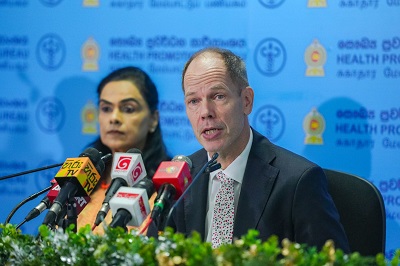Colombo, (Asian independent) With an aim to control the ongoing measles outbreak in Sri Lanka, the island nation will begin a special vaccination drive from Saturday to curb the spread of the disease.
In 2019, the World Health Organization (WHO) had declared Sri Lanka as a country that eliminated measles, interrupting transmission of the indigenous virus that causes the killer childhood disease.
However, more than 700 case have been reported in the island nation since May last year.
The supplementary measles immunization activity (SIA) will be implemented in two phases with the joint aid of the WHO and Unicef.
The drive will target 6 to 9 month-old infants in nine identified districts, including capital Colombo and Northern Province’s Jaffna, where measles cases have been reported.
The children in this age group wll be given an additional dose of MMR (measles, mumps and rubella) vaccine despite past history of clinical measles, according to the Health Ministry’s Epidemiology Unit.
The second phase, which will begin on January 20, will target children of other age groups across the country.
“Supplementary Immunization of MMR vaccination should be considered as an additional vaccination dose and due routine MMR vaccination should be given to all children who have received SIA-MMR vaccination, on completion of 9 months and 3 years of age,” the Health Ministry stated.
“Unicef, as well as WHO, has been closely associated partners with the Ministry of Health for many years in the implementation of the national immunization programme, which is a success story in Sri Lanka. However, even with a high immunization coverage, measles outbreaks can occur among unvaccinated children, especially when there are outbreaks in the region. While the numbers are small with the recent measles outbreak, it is important to take it seriously,” the Unicef Representative in Sri Lanka, Christian Skoog warined.
“The cases reported so far have been mild, and no deaths have been reported. However, measles can be a major childhood disease, which can and must be prevented,” says Alaka Singh, the WHO Representative to Sri Lanka.
The MMR vaccine was introduced into Sri Lanka’s immunization program in 1984.
In 2001, a second dose of the vaccine was introduced to improve population level immunity and in 2019, the WHO declared Sri Lanka as a country free of measles.
However, a significant drop in global immunization coverage from 2020 to 2022 impacted many countries in the region, which has led to a rise in measles cases once again, including in Sri Lanka, according to the Unicef.









